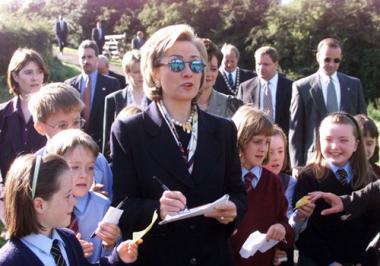The first time I saw Hillary Clinton speak in person, she addressed about 80,000 people. But they hadn't come to see her.
The time was November, 1995 and the place was the downtown area of my native Belfast. The Irish Republican Army had called a ceasefire a little over a year before and the sense was building that a real peace might take hold.
That feeling was crystallized by the first visit of a U.S. president to Northern Ireland. Bill Clinton was the attraction that chilly night in November. "All across Northern Ireland, the desire for peace [is] becoming a demand," he said. He was received rapturously.
My memory of the First Lady's speech is that it was longer than her husband's, more cerebral but also less capable of holding the massive crowd's attention.
Part of the problem was stylistic. The senator still has limitations as a podium speaker, but she was even stiffer back then. The bigger issue was one of political relevance. Neither on that visit, nor during the subsequent period leading up to the landmark Good Friday Agreement of 1998, do I recall her being regarded as anything resembling a critical player in the push for peace.
Exactly what role the senator played in political developments on a small island a decade ago should perhaps be irrelevant to her presidential ambitions. But she has made it relevant—and contentious—by claiming that her involvement in Northern Ireland is one of the things that make her more qualified than Barack Obama to assume the role of commander-in-chief.
"I helped to bring peace to Northern Ireland," she told CNN recently. That claim has become part of a campaign narrative that also asserts relevant experience in Bosnia (where Mrs. Clinton made a one-day visit in the wake of the Dayton accords) and in China (where she delivered her famous "women's rights are human rights" speech in 1995).
Give Clinton her due. She visited Northern Ireland seven times between 1995 and 2004, she is very well informed about its politics and its problems, and she, like her husband, is generally held in high esteem in Ireland.
But what did she actually do to help achieve peace there? Some say the answer is "not much." And even the answers supplied by her allies tend to be vague.
David Trimble, who signed on to the Good Friday Agreement as leader of what was then the largest party in Northern Ireland, the Ulster Unionists, told London's Daily Telegraph that Clinton was "a wee bit silly" for exaggerating her role.
"I don't want to rain on the thing for her, but being a cheerleader for something is slightly different from being a principal player," Trimble said.
The Telegraph also quoted a negotiator for the Irish Nationalist SDLP party, Conall McDevitt, who was an aide to its then-leader John Hume. "There would have been no contact with her either in person or on the phone," McDevitt recalled.
The Chicago Tribune also carried out its own investigation into Mrs. Clinton's claims. Though former Senator George Mitchell, the man who adroitly guided the peace negotiations to a successful conclusion, graciously allowed that Mrs. Clinton was "very helpful," Irish historian Tim Pat Coogan dissented.
"It was a nice thing to see her there with the women's groups. It helped, I suppose," Coogan said. "But it was ancillary to the main thing."
The Clinton campaign wasted no time trying to rebut those arguments. But the testimonials they produced were full of generalities. Hume said she "visited Northern Ireland, met with very many people and gave very decisive support to the peace process" ? but what was "decisive" about her visits remained unstated.
Elsewhere, Irish prime minister Bertie Ahern told the Times-Tribune of Scranton that Mrs. Clinton had been "hugely helpful." But Ahern went on to say that at the time of the peace negotiations, "She was the First Lady of the United States, not a party leader in Northern Ireland. No one would expect her to get into the nitty-gritty of the process."
But isn't an involvement in the nitty and gritty precisely what Clinton is now claiming? After all, she told National Public Radio last week that the role she played was "instrumental."
As a concrete example of her role, she recently told the Irish Voice that the Vital Voices conference she organized in Belfast in late summer 1998 "helped ensure the women were relating to one another on the ground level, and that enabled them to make personal connections and create the trust and confidence essential for leaders to take the steps they took."
The Good Friday Agreement had already been signed and approved in referenda on both sides of the Irish border by that point. The only political vehicle for the kind of cross-community, female empowerment that Clinton so emphasized was the short-lived Northern Ireland Women's Coalition. Set up in 1996, the coalition scaled the dizzy heights of winning two seats in the 108-member Northern Ireland Assembly in 1998. At the next assembly elections, both members lost their seats. The party disbanded two years ago.
Hillary Clinton's role in Northern Ireland should not be dismissed. She visited and engaged with the conflict when she did not have to do either. Her presence as First Lady augmented the important sense that the White House was invested in a successful outcome to the peace talks. And she has kept herself conversant with Irish issues since then. But to suggest she was "instrumental" in bringing peace to Ireland is more than a wee bit silly.



